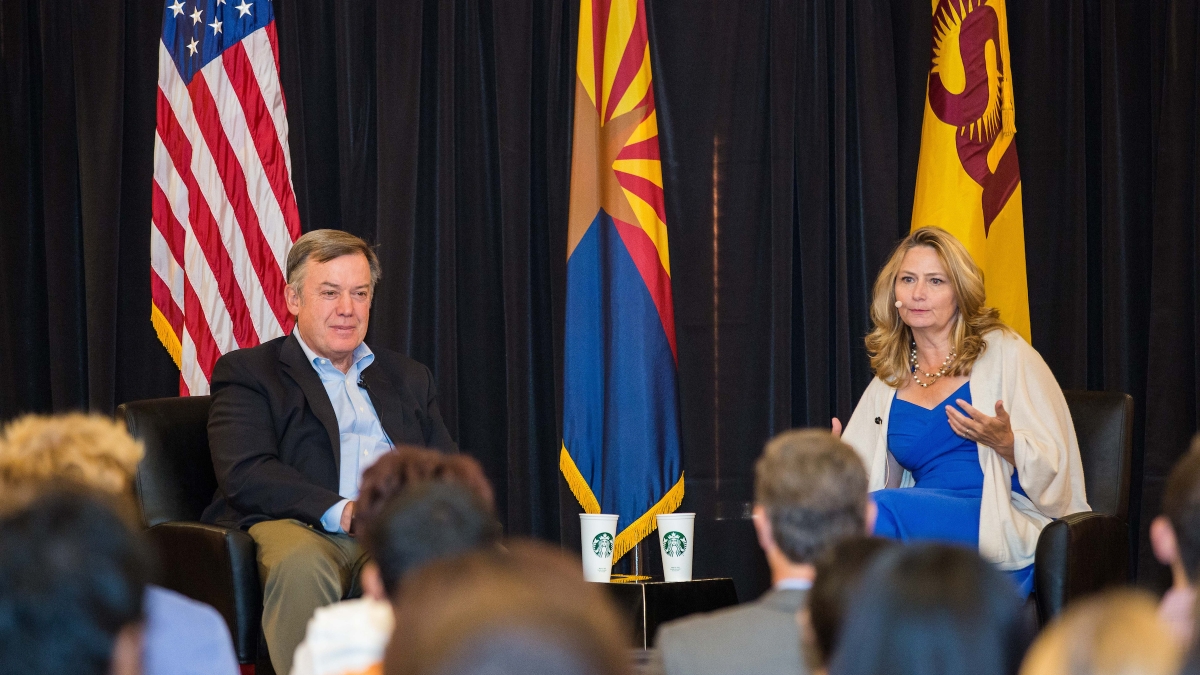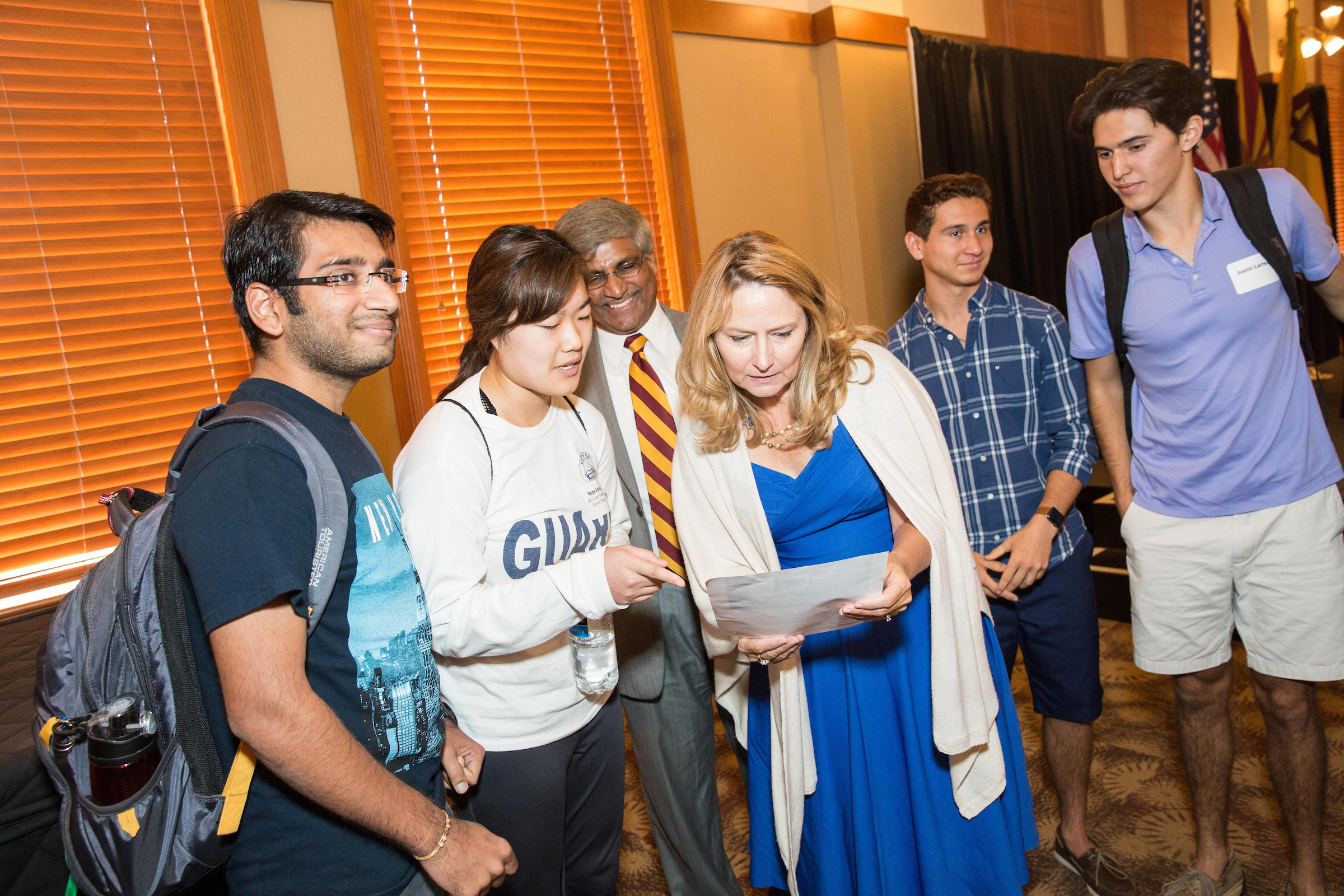Technology is a world-changing innovation that has not only revolutionized the way we do business but also has been a way to bring people together, according to the chief technology officer of Starbucks.
“One of the things I’ve been passionate about since I was an undergraduate is not technology for technology’s sake, but how it touches humans,” said Gerri Martin-Flickinger, who has been executive vice president and chief technology officer at Starbucks for two years. She participated in a question-and-answer session with Arizona State University President Michael M. Crow on the future of technology Thursday at Old Main on the Tempe campus.
Martin-Flickinger has led Starbucks, which has more than 24,000 coffee stores worldwide, through several technology advances, such as mobile order and pay, voice ordering and social gifting.
While noting that technology enhancements deliver exciting new experiences for customers, Martin-Flickinger also explained that the human connection remains a central priority for the company.
“Starbucks stores are all about the experience,” she said. “I don’t believe we should remove the human connection. For example, I like when the barista asks me how my day is going.
“You have to think of technology as a whole system,” she told the room full of students.
Crow said that the ASU Online program has also relied on the importance of human interaction.
“We’ve learned that the human touch is essential to an ongoing relationship. Removing the human touch reduces the probability that the relationship will continue,” he said.
ASU and Starbucks are in a strategic partnership through the Starbucks College Achievement Plan, a program that offers Starbucks partners the opportunity to earn a bachelor’s degree through ASU Online, tuition-free.
“Starbucks is a company that was very easy for us to work with,” Crow said. “They are a corporation with a conscience, and they view the development of their employees and human beings the same way we do — that it has to be done deliberately, focusing on the person and their success.”
Crow noted that the event was held in the main classroom of what was the Territorial Normal School — the teachers’ college that was the precursor to ASU.
“Starbucks has allowed us to teach people we would not normally be able to reach,” he said. “We feel excited about being able to do that.”
ASU chemical engineering junior Hope Jehng talks with Starbucks CTO Gerri Martin-Flickinger following a discussion about the future of technology at Old Main on Thursday morning in Tempe. Photo by Deanna Dent/ASU Now
Most recently, Starbucks has opened a technology center at SkySong that employs several ASU students — plus a graduate of the Starbucks College Achievement Plan. Martin-Flickinger said the center is working on data analysis, security and mobile app development.
“They’ve been there for two weeks, and they’re already writing real code that will show up in real life,” she said.
She described how the complexity of Starbucks has driven innovation in the company’s technology.
“We have more than 24,000 stores, and we operate in 75 countries,” she said, adding that some stores are company-owned, but others are licensed, joint ventures or franchises.
Add to that the fact that the vast majority of the stores’ business occurs during about three hours of the day — a surge of 20 times capacity. So Martin-Flickinger shifted the company’s technology to the cloud, which can handle the blast of activity.
Martin-Flickinger said she has seen a shift in the skills of computer science graduates over the past few years, who are better at communications — crucial in the corporate world.
“People forget that to be a great technologist, you have to sell ideas,” she said, adding that other key abilities are project-management skills and collaboration as a mind-set.
Crow said that when he was in graduate school in the 1980s, he studied how science and technology could affect democracy — including warnings about the “dark side” of technology.
“It’s a funny and complex set of fast-moving changes that are occurring now, and there are huge amounts of fear in the general population that it will be so disruptive that our social fabric will be affected,” he said.
Martin-Flickinger said she’s optimistic about the ways technology will bring people together and promote accessibility, such as translation, voice activation and vision recognition.
“I see a lot of those having positive implications to society, and they can be nurturing,” she said.
Top photo: Starbucks CTO Gerri Martin-Flickinger addresses students during her conversation with ASU President Michael M. Crow. Photo by Deanna Dent/ASU Now
More Science and technology

Compact X-ray laser lab aims to reveal deep secrets of life, matter and energy
X-rays allow us to view inside the human body to diagnose broken bones and other hidden problems. More recent X-ray advances are making it possible to see events at the scale of atoms and molecules,…

Apollo lunar samples enable ASU researcher to pinpoint moon’s crystallization timeline
A team of researchers, including Arizona State University geochemist Melanie Barboni, in collaboration with scientists from The University of Chicago, have made a new discovery about the history of…

NASA launches space telescope to chart the sky and millions of galaxies
California’s Vandenberg Space Force Base was the site for Tuesday’s 8:10 p.m. launch of the NASA SPHEREx mission aboard a SpaceX Falcon 9 rocket.The SPHEREx (Spectro-Photometer for the History of the…



